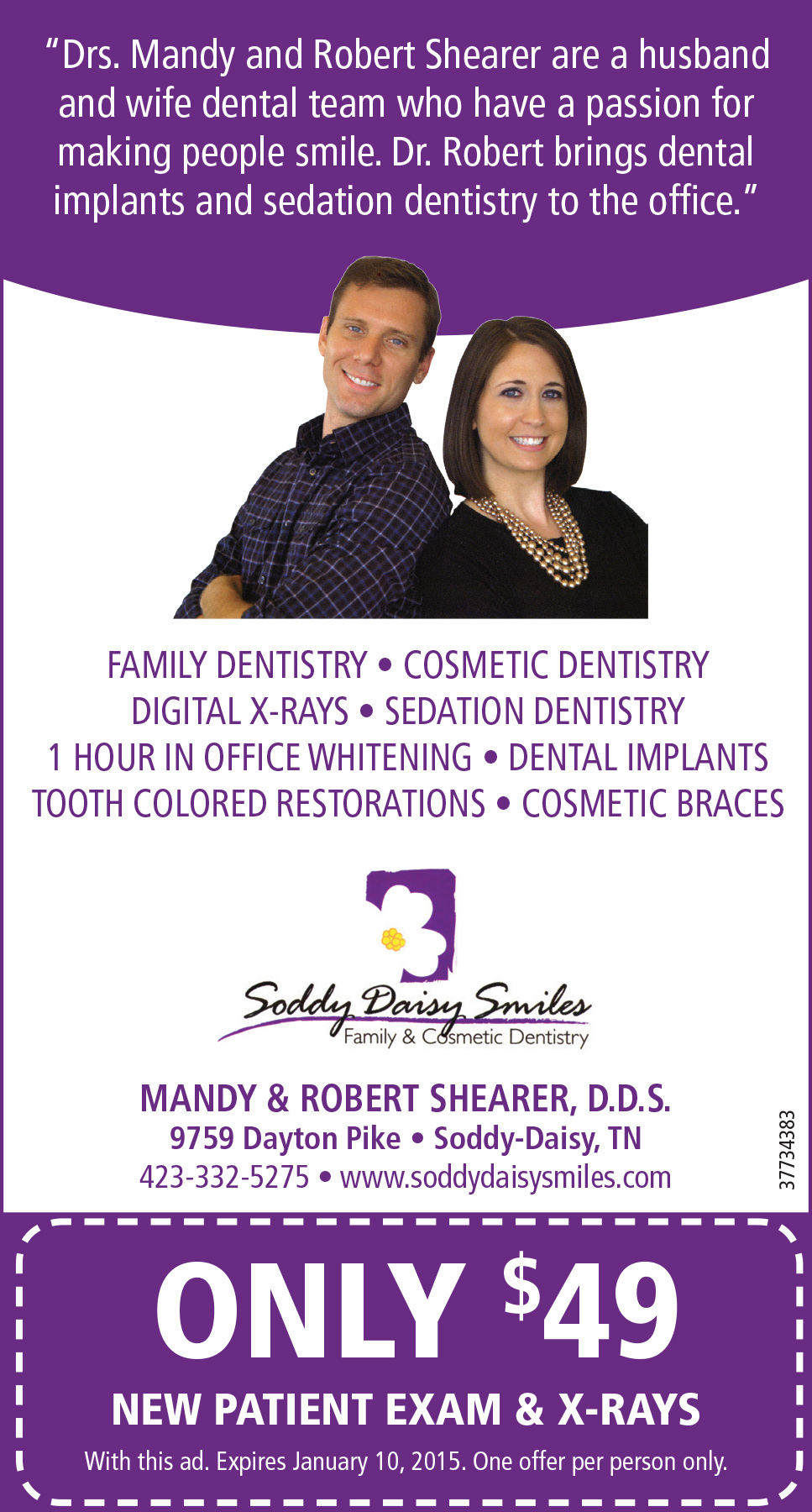Drs. Bob and Mandy Shearer of Soddy Daisy Smiles answer some commonly asked dental questions.
How can I improve the whiteness of my teeth?
There are several different options when it comes to whitening products, including whitening toothpastes,over-the-counter gels, rinses, strips, trays and whitening products obtained from a dentist. “The products found at the drugstore will generally get your teeth about one shade whiter, but if you are not getting the results you are looking for, schedule an appointment with our office and we will go over the procedures and options best available to you personally,” says Dr. Mandy. Sometimes the discoloration can be caused by food/drinks, tobacco use, medications, trauma or even a failing dental material that needs replacing. In some cases, it may require more than just whitening.
What can I do to prevent bad breath?
Bad breath, or halitosis, can result from a variety of things, like poor dental health habits, and may be a sign of other problems. Bad breath can also be made worse by the types of foods you eat and other unhealthy habits. “Bad breath can be reduced or prevented if you practice good oral hygiene (including brushing your tongue), stop smoking and chewing tobacco, drink lots of water and see your dentist regularly to detect and treat periodontal disease, dry mouth and other problems that may be the cause of bad mouth odor,” says Dr. Bob. If these tricks don’t help, keep a log of when you notice the bad breath. It could be a medication you are taking, sinus drainage or even acid reflux.
What is gingivitis? What are its causes?
Gingivitis is the mildest form of gum disease, or periodontal disease, which is an infection of the tissues that surround and support the teeth. Gingivitis is caused by an overgrowth of harmful bacteria in the mouth. The most common symptom is red, swollen gums that bleed easily, and it should be taken seriously. If left untreated, it can lead to periodontitis, a more severe form of periodontal disease that can result in tooth loss. Fortunately, gingivitis can be treated and reversed by controlling the levels of bacteria in the mouth. Proper brushing and flossing can help, and certain medications and mouth rinses may also be used to kill the bacteria.
What is xylitol?
Xylitol is a natural sweetener found in many berries, fruits and vegetables. It’s widely used as a sugar substitute and in “sugar-free” chewing gums, mints and other candies, and research shows it can even help you keep your smile healthy. When mixed with sugar, bacteria in the mouth will produce an acid that breaks down enamel (the outer layer of your teeth). With xylitol, the bacteria cannot produce acid. Using xylitol as a sweetener instead of sugar will help prevent tooth decay.
Why are dental X-rays taken?
“Dental X-rays are used to create a picture of teeth and gums, and the bone and ligaments that hold teeth in place,” says Dr. Mandy. “This picture is called a radiograph, and it is used by dentists to look for disease or check on tooth development that cannot be seen with the naked eye.” Dentists use radiographs to check for signs of tooth decay, missing teeth, infections, gum disease, cysts and some types of tumors.
X-rays can also measure the progress of certain dental procedures or treatments that cannot be viewed with the eye. Root canal therapy and the placement of dental implants are two examples. When viewing
the dental X-rays of children and teenagers, dentists will check to be sure there is enough space available for incoming teeth. They also monitor the development and position of third molars (wisdom
teeth). Taking X-rays can help dentists find oral health problems at an early stage. Teeth and their supporting structures change over time, so X-rays need to be taken often enough to identify any developing problems.
How can I relieve a toothache?
Schedule an appointment with your dentist as soon as you can to find out what is causing your toothache; in the meantime, you can provide temporary relief. “What we find works best for our patients is to use an over-the-counter antiseptic containing benzocaine, like Orajel,” says Dr. Bob. “This is a
much better toothache remedy than placing aspirin directly against your gums, which may burn your gum tissue. Also, don’t underestimate the effectiveness of over-the-counter anti-inflammatories, like
Ibuprofen, used according to manufacturers’ guidelines.” If the sensitivity is from a lost crown or broken filling, there are products available over the counter that can be placed temporarily until you can
see your dentist.
MORE INFORMATION
Soddy Daisy Smiles is located at 9759 Dayton Pike in Soddy-Daisy. To request an appointment, visit soddydaisysmiles.com, call 423-332-5275 or email soddydaisysmiles@gmail.com.

